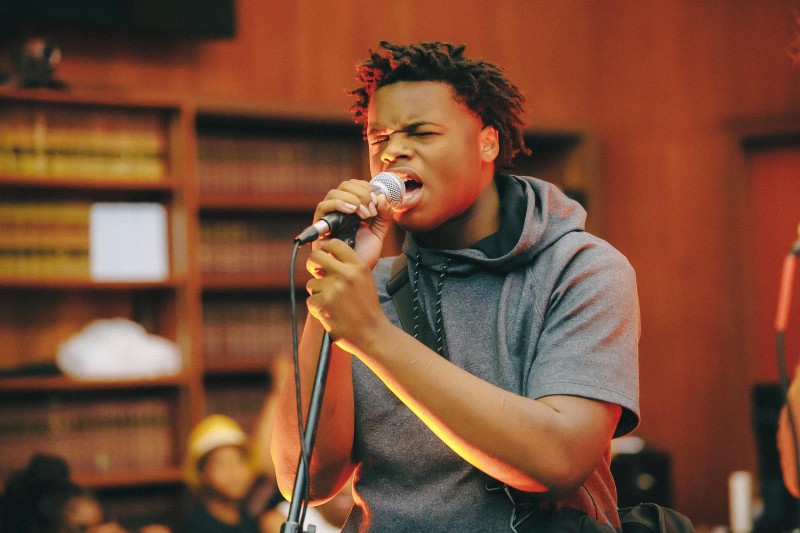Out of the Cave: Rapper Killa Kam stepped into the spotlight in 2022 with an outstanding debut album

Killa Kam has the kind of speedy and confident flow that pairs well with an atypical hip-hop producer like Scary Steve Klingbiel, who mixes in off-kilter sounds with his beats that might trip up a less talented rapper.
Together, the duo produced the excellent Cave That I Left album, which showcases a dynamic new voice on the Washtenaw County music scene.
Formula 734’s “Volume II” Album Documents Post-Pandemic Perseverance for Washtenaw County Men of Color

Formula 734’s Volume II chronicles the ongoing perseverance of Washtenaw County men of color in a post-pandemic world.
The hip-hop collective’s second community-based album features insightful tales of self-determination by lyricists confronting daily struggles and aspiring for future change.
“Coming out of COVID, we’ve had to appraise our value of everything. In listening to the young guys, they’re using music to appraise their thoughts about relationships, school, and mortality,” said Rod Wallace, who co-executive produced the album with Jamall “Buff1” Bufford.
“We always say that kids are a lot more resilient than adults are … but in the same token, when they look back and when we look back at this time, it was a time the entire world transitioned in a way. This music is them making sense of that transition.”
To ease that transition, Wallace and Bufford reassembled an intergenerational team of men to write and record 10 cathartic tracks for Formula 734’s Volume II.
They created the album in partnership with Washtenaw My Brother’s Keeper, the Ann Arbor Community Foundation, the Washtenaw County Prosecutor’s Office, Project Plugin, and Creativity Fluidity Productions.
Friday Five: Kenji Lee, Moorhaus, Ekanti, Othercast, Arthur Durkee

Friday Five highlights music by Washtenaw County-associated artists and labels.
This week features jazz from Kenji Lee's Fortune Teller Trio, indie-folk by Moorhaus, dance jams via Ekanti, dark-ambient by Othercast, and reinterpreted seasonal classics courtesy of Arthur Durkee.
Fine Tuning: Martin Bandyke says goodbye to his morning radio show and hello to having even more time for music

It always seems like Martin Bandyke is smiling on the radio.
A grin doesn't make a sound, but the way Bandyke enunciates his words and presents them to his audience every morning on 107.1-FM gives listeners the impression he's speaking through a smile.
A recent visit to the WQKL studios near Briarwood Mall in Ann Arbor confirmed as much:
He actually is smiling as he speaks.
Whether reading traffic updates or music news, Bandyke projects the sort of positivity people appreciate when they're trapped in their cars during a morning commute or settling in for another day of the 9 to 5.
The DJ's convivial charms have radiated through the radio for 40 years—starting in 1983 on WDET 101.9-FM in Detroit—but on December 22, Bandyke is stepping away from his morning-drive show and entering semi-retirement at age 68. He'll still host his long-running Fine Tuning program every Sunday afternoon on the station, still choosing every song that's played on the show, just as he did during his public radio days.
Bandyke's first stint on the air was in 1983 co-hosting WDET's Monday night show Dimension. He had been trying to get his foot in the door of Detroit radio ever since graduating from the University of Michigan in 1976 with a bachelor of arts degree in radio, television, and film. His on-air opportunity came when he was a music buyer for his hometown Dearborn Music record store. Bandyke, a drummer, and Ralph Valdez, his longtime friend and frequent bandmate, were invited to co-host Dimension, which they did together through 1990. While Valdez continued to host Dimension, which moved to Sunday nights, that year Bandyke was hired full-time as the assistant music director, and in 1991 he took over Judy Adams' on-air shift from 10 am to 1 pm. He later moved to afternoons and in 1995 added music director to his duties at the station.
This is the part of the tale where Bandyke's voice and expansive music tastes entered my life.
Pull up a chair and let grandpa tell you a story.
AADL 2022 Staff Picks: Homepage

Don't ever write a year-in-review intro before you've had lunch. See below for reasons:
2022 is Pulp’s sixth year of compiling a delectable list of Ann Arbor District Library staff picks, featuring a smorgasbord of media to review and devour. With an insatiable hunger for books, films, TV shows, podcasts, music, and more, our AADL staffer suggestions will whet your appetite for anything you may have missed in 2022—or from previous years.
Because who can keep current with everything on the media menu these days?
The current media landscape is a 24-hour grocery store with everything everywhere available all at once. It’s decision paralysis at the deli counter, so consider us your Instacart shoppers for things to read, watch, play, listen to, and experience. (Apologies if we missed anything on your shopping list, and we hope our substituting a banana for that frozen pizza is OK.)
With more than 36,000 words to ingest in the 2022 Staff Picks, we’ve divided everything into four separate courses so you can enjoy each portion at your leisure:
➥ AADL 2022 Staff Picks: Words
➥ AADL 2022 Staff Picks: Screens
➥ AADL 2022 Staff Picks: Audio
➥ AADL 2022 Staff Picks: Pulp Life
If you feel inspired as you eat up our words, let us know in the comments sections what you sank your teeth into this year. Your tasty tips can be from 2022 or any other era; it just needs to encompass whatever art, culture, or entertainment you enjoyed over the past year.
Now, open up these posts and chow down.
We’re off to make some spaghetti.
AADL 2022 STAFF PICKS: WORDS

➥ AADL 2022 Staff Picks: Homepage
➥ AADL 2022 Staff Picks: Screens
➥ AADL 2022 Staff Picks: Audio
➥ AADL 2022 Staff Picks: Pulp Life
AADL 2022 STAFF PICKS: WORDS
Books, audiobooks, graphic novels, comics, websites, and more:
AADL 2022 STAFF PICKS: SCREENS

➥ AADL 2022 Staff Picks: Homepage
➥ AADL 2022 Staff Picks: Words
➥ AADL 2022 Staff Picks: Audio
➥ AADL 2022 Staff Picks: Pulp Life
AADL 2022 STAFF PICS: SCREENS
TV, movies, DVDs, YouTube, streaming, etc.:
AADL 2022 Staff Picks: Audio

➥ AADL 2022 Staff Picks: Homepage
➥ AADL 2022 Staff Picks: Words
➥ AADL 2022 Staff Picks: Screens
➥ AADL 2022 Staff Picks: Pulp Life
AADL 2022 STAFF PICS: AUDIO
Music, podcasts, CDs, records, and more:
AADL 2022 Staff Picks: Pulp Life

➥ AADL 2022 Staff Picks: Homepage
➥ AADL 2022 Staff Picks: Words
➥ AADL 2022 Staff Picks: Screens
➥ AADL 2022 Staff Picks: Audio
AADL 2022 STAFF PICS: PULP LIFE
Games, apps, sports, outdoors, and any other kind of hard-to-categorize cultural and life activities:
Friday Five: Balance, Hannah Baiardi, Lunch, HUES, Grandmaster Rodimus

Friday Five highlights music by Washtenaw County-associated artists and labels.
This week features jazz by Balance, soul-pop by Hannah Baiardi, no wave by Lunch, and hip-hop by HUES and Grandmaster Rodimus.


































